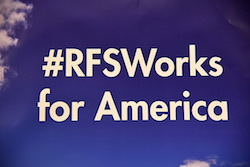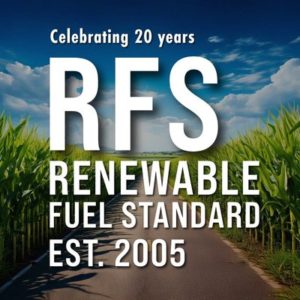 A bi-partisan, bicameral resolution was introduced in Congress to recognize the 20th Anniversary of the Renewable Fuel Standard (RFS) and its foundational role in strengthening the United States’ energy security, supporting rural communities, and growing the American economy.
A bi-partisan, bicameral resolution was introduced in Congress to recognize the 20th Anniversary of the Renewable Fuel Standard (RFS) and its foundational role in strengthening the United States’ energy security, supporting rural communities, and growing the American economy.
Congressman Max Miller (R-OH) led the resolution in the House, joined by Rep. Don Bacon (R-NE), Rep. Mike Bost (R-IL), Rep. Nikki Budzinski (D-IL), Rep. Angie Craig (D-MN) Rep. Rep. Randy Feenstra (R-IA), Rep. Mike Flood (R-NE), Rep. Mariannette Miller-Meeks (R-IA), Rep. Zack Nunn (R-IA), and Rep. Adrian Smith (R-NE). The Senate companion bill is led by Sen. Pete Ricketts (R-NE) along with Sen. Joni Ernst (R-IA), Sen. Deb Fischer (R-NE), Sen. Chuck Grassley (R-IA), Sen. Amy Klobuchar (D-MN), and Sen. Tina Smith (D-MN).
Commenting on the anniversary today, Renewable Fuels Association President and CEO Geoff Cooper said, “Over the past two decades, the Renewable Fuel Standard has delivered tremendous benefits for our nation—reducing dependence on foreign oil, lowering fuel costs for consumers, creating hundreds of thousands of jobs across rural America, and strengthening the agricultural economy. It has spurred market competition and expanded choices at the pump for drivers nationwide.”
RFA published a report on ethanol industry successes since this landmark policy was put into place and released a podcast interview with Cooper about the importance of the RFS and its achievements.
Clean Fuels Alliance America, formally the National Biodiesel Board, also commemorated the anniversary today and applauded the congressional resolution.
Clean Fuels Vice President of Federal Affairs Kurt Kovarik said, “Under the RFS over the last twenty years, U.S. biodiesel and renewable diesel production has grown from a few hundred million gallons to 5 billion gallons, meeting 9 percent of the nation’s on-road diesel demand. Biodiesel and renewable diesel production is vital for America’s economy, supporting $42.4 billion in economic opportunity. It is essential to America’s farmers, supporting 10 percent of the value of every soybean grown in the United States. With robust RFS volumes proposed for the coming years, the benefits keep growing.”
 Also celebrating the milestone today is the National Corn Growers Association. NCGA and state corn grower groups were on the forefront of the issue in the 1990s and early 2000s, pushing for a national law that would allow use of biofuels in the nation’s fuel supply.
Also celebrating the milestone today is the National Corn Growers Association. NCGA and state corn grower groups were on the forefront of the issue in the 1990s and early 2000s, pushing for a national law that would allow use of biofuels in the nation’s fuel supply.
“Since it was signed into law, the Renewable Fuel Standard has provided immeasurable benefits to Americans,” said Illinois farmer and NCGA President Kenneth Hartman Jr. “It has dramatically increased demand for corn, provided significant savings to consumers at the pump and strengthened America’s energy dominance.”
“There is more work to be done if we are going to fully unleash the power and benefits of ethanol,” Hartman said. “But today, we are going to celebrate a hard-fought victory that has resulted in countless benefits for corn growers and indeed all Americans.”









